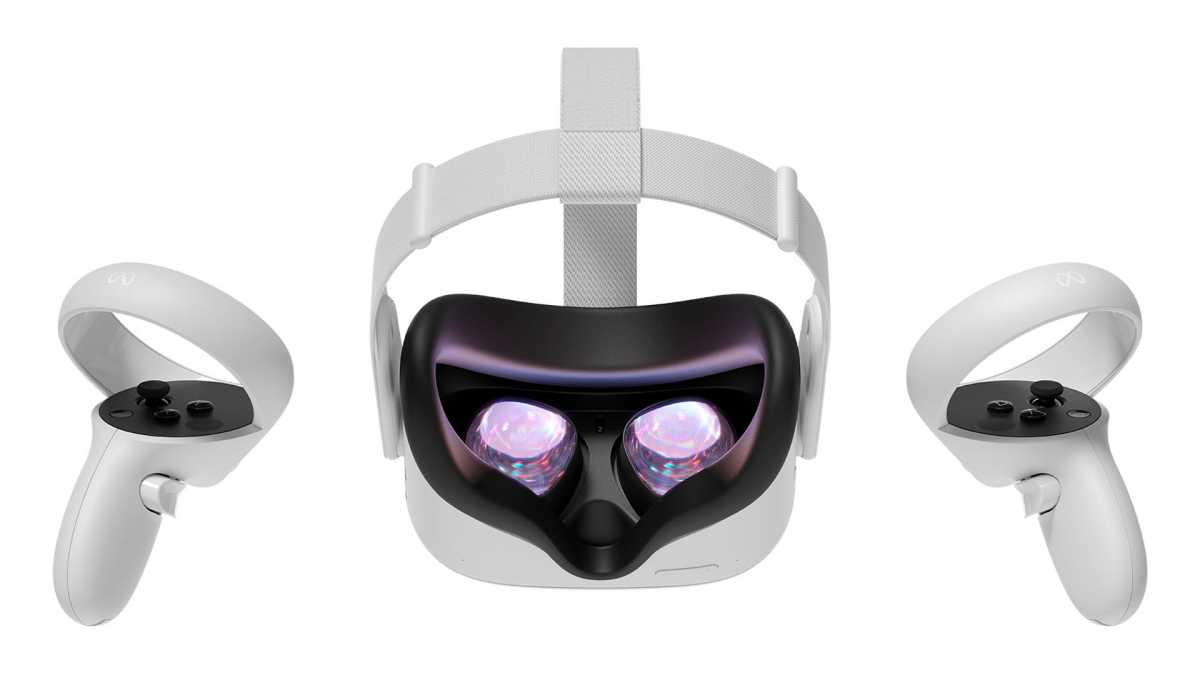The Steam Deck is the hottest PC hardware around. It’s also incredibly hard to get your hands on one, in both the literal and figurative senses. After initial preorders were claimed, wait times for Valve’s portable PC gaming machine jumped up to weeks, then months. Right now the soonest you might get one in the US (without resorting to scalpers) is after the third quarter of the year.
But as cool as the Switch-style portable PC is, we all know that part of the desire for new, nerdy tech is novelty. With that in mind, I want to suggest an alternative for PC gamers starved for the new and different. Take the $400 (at a minimum) you would have spent on a Steam Deck, and buy a Meta Quest 2 instead.
Hear me out.
The Quest 2 is the cheapest way to experience VR
You’ve got a few choices for VR headsets on the market. And starting at $300, the Quest 2 is easily the cheapest of them. The stand-alone, Android-powered headset essentially plays mobile games, not the more intense PC-powered VR games seen elsewhere. Since VR isn’t for everyone, jumping whole hog into the $1,000 Valve Index might not be the best choice, even if you do have the PC hardware (and the space) necessary to use it.

Meta
The next-most popular VR headset that’s still being sold is HP’s Reverb G2 on the Windows Mixed Reality platform, still twice as expensive as the Quest 2. If you want to get into virtual reality gaming without spending an arm and the leg, it’s pretty much the only choice.
The Quest 2 works great with Steam
Here’s the thing that a lot of gamers don’t know: Despite being a stand-alone headset that’s heavily tied into the Oculus/Meta platform, the Quest 2 works fantastic with Steam. In fact, it’s by far the most popular VR headset with Steam users, taking up nearly half the userbase with more than three times the amount of Steam users as Valve’s own Index headset.
This is because of the Quest 2’s killer Oculus Link system. You can connect directly to your gaming PC to get access to desktop VR programs via the Oculus Store, or connect directly to Steam VR. This effectively gives you access to every VR game on Steam — even high-end games like Half-Life Alyx, Skyrim VR, and Boneworks. The games are running on your PC and displaying on the Quest 2, giving the cheap little headset access to the kind of PC power it can never have on its own.
Even better, if your local Wi-Fi is speedy enough, you can access the Oculus Link desktop system wirelessly. This gives you a new degree of untethered freedom, which desktop-based VR systems don’t have without expensive add-ons.
The Quest 2 is portable
Thanks to its built-in Android software and internal battery, the Quest 2 is more than happy to jump in your backpack and come with you on a trip. While it’s not a truly portable game system in the same sense as the Steam Deck, it’s capable of playing video content or browsing the web from a car or airplane seat. And thanks to its built-in cameras for environmental tracking, it needs only a few seconds of setup to start playing games in a hotel room. The stationary barrier system means you can play most games with just a few feet of free space.
When untethered from your PC, the Quest 2’s app library is limited to what Android-based games you can download from the Oculus Store. But that’s still a fairly impressive library, and you can further augment it by sideloading from third-party directories like SideQuest. VR games aren’t nearly as varied (or, frankly, polished) as the massive library of Steam games available on the Steam Deck, but it’s still more than enough to keep you occupied during a layover.
The Quest 2 is novel
Let’s be honest: a lot of the appeal of the Steam Deck is the novelty of having the power to run real, full desktop PC games in a new format, one that you can stick in a pocket. (At least if your pocket is in one of those massive JNCO jeans from the 90s. Most people probably use a bag.) At $400 to $650, the Steam Deck isn’t exactly an impulse buy for most people, but it’s cheaper than both a gaming laptop and most of the alternative Switch-style PC gaming machines on the market.
But the thing about novelty is that it comes in many forms. If Valve’s official stab at portable gaming is being denied to you by its own popularity and the continuing worldwide chip shortage, the Quest 2 might scratch that same itch in your brain. After a brief period of pandemic-related scarcity, it’s now back on electronics shelves commonly enough that trying to find one shouldn’t take more than a week or so.
There is one major downside to the Quest 2: it’s a Meta product, AKA a Facebook product. Despite a promise to allow new users to access the Quest 2 without a Facebook account sometime this year, that hasn’t come to pass, and frankly it wouldn’t shock me if Facebook drags its feet as much as it can.
You might object to any system in which Facebook gets access to your data, and you’d be more than justified in that objection. While it’s certainly possible to use the Quest 2 without giving Facebook any more money than the purchase price, cutting yourself off from the Oculus store severely hampers its effectiveness as a gaming machine. (Especially a portable one.)
In short, if you’re trying to engage with Facebook as little as possible, the Quest 2 is still a no-go. Unfortunately there’s no real alternative to it in its price range.
A new perspective
I’m not here to champion virtual reality as the next frontier of gaming. I think that’s possible, but it’s a long way off, and conventional “flatscreen” gaming on consoles and PCs isn’t going anywhere anytime soon. But VR is a lot more interesting and engaging than I gave it credit for just a few months ago.

Meta
The immersive aspects of a true 3D perspective and motion controls can’t be overstated. Even a decade-old game like Skyrim takes on a new dimension — literally — when you feel like you occupy a physical space that reacts to your presence and movements. It’s something worth experiencing, especially as more and more games launch exclusively in the format.
The Steam Deck is cool. But it’s only going to play the games that, as a PC gamer, you already have access to on your main machine. The Quest 2 opens up an entirely new type of gaming to both portable and PC players. And, of course, it’s actually available right now. Give it a shot.



